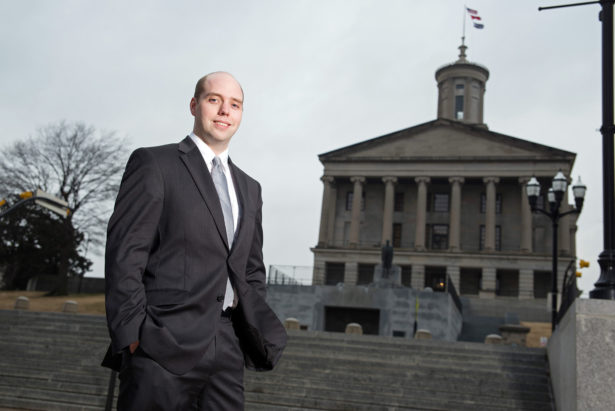Jacob Hayes (Knoxville ’13) is one of dozens of UT students who have built their careers in politics after a legislative internship. Partially funded by the UT Alumni Association, the Tennessee Legislative Intern program provided Hayes with a hands-on experience that he continues to be passionate about as a bill clerk for the Tennessee House of Representatives. He plans to pursue law school in the fall.
Photo: Adam Brimer
By Chandra Harris-McCray
Those wee hours spent debating politics in a Perkins restaurant booth made Jacob Hayes (Knoxville ’13) hungry for the grit and grind of the state legislature. Hannah Parker (Knoxville ’08), however, wasn’t sure she had what it took to ride the political wave. But the former art and English major went ahead and applied for a legislative internship “because, if nothing more, it would be good interview experience,” she recalls. Parker now serves as the deputy director for operations in Gov. Bill Halsam’s office. And what began as an internship for Hayes as a bill clerk for the Tennessee House of Representatives has turned into a full-time gig. Hayes and Parker represent dozens of UT students whose after-college career paths were solidified because of the Tennessee Legislative Intern program.
Partially funded by the UT Alumni Association, the hands-on political engagement experience gives a voice to civic-minded juniors, seniors and graduate students throughout the UT System. “Interns get to witness and play a part, albeit small, in the making of history,” explains UT Knoxville political science professor David Folz, who also coordinates the legislative internship program. “They learn about the state legislative process, how representatives serve constituents and how decisions get made or not made,” he says. “Through the variety of tasks they perform, whether it involves preparing briefing packages, investigating constituents’ issues, conducting policy research or affixing ribbons to graduation certificates, interns acquire knowledge and experience beyond the typical classroom exposure. And often it leads to amazing careers.”
Serving the greater good is what kept Parker vested in politics. Initially determined to be a journalist, Parker first attended a private liberal arts college before transferring to UT Knoxville and changing her major to political science. After serving as “part receptionist, part constituent services, part note taker, and part errand runner/copy girl” during her legislative internship, Parker went on to another internship with the city of Knoxville, which parlayed into part-time work and then a full-time job. Nashville became home for Parker after Haslam’s title changed from mayor to governor. She says, “I am 100 percent confident that I would not be working in Nashville today had it not been for the experience I was offered as a legislative intern while at UT.”
With his sights set on law school in the fall, Hayes, who began his collegiate track in pre-med, credits the legislative intern program with being able to “witness significant changes to laws that affect the lives of Tennesseans every day,” he says. “During my time in the House Transportation committee, where I was the primary clerk, sitting beside the chairman, I saw contentious bills regarding whether or not Tennesseans should be required to wear motorcycle helmets and changes to drunk driving laws. I became further impassioned by the ideas that fuel political discourse. The internship offered an invaluable experience that has forever shaped my career path.”

